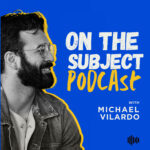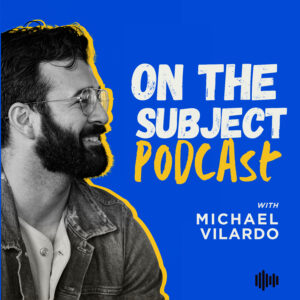#43 – Las Cruces Public Schools’ Jaime De La Torre on Expanding Impact and Innovating with AI in Education [VIDEO]

On This Episode
Episode Transcript
Guest: Jaime De La Torre, Director, Las Cruces Public Schools
Host: Michael Vilardo, Co-founder & CEO of Subject
Michael Vilardo (00:12–00:52):
Welcome back to another episode of On the Subject. I’m your host, Michael Vilardo, co-founder and CEO of Subject.com.
Today has been a special one — we’re highlighting the most innovative educators in the U.S.
We’ve visited Los Angeles and Michigan, and now we’re in Las Cruces, New Mexico.
Our guest today has impacted hundreds of thousands of students across both Texas and New Mexico — a truly unique perspective.
Please welcome Jaime De La Torre, Director at Las Cruces Public Schools, the second largest district in New Mexico. Thank you for joining us!
Jaime De La Torre (00:53–00:53):
Thank you for having me.
Michael Vilardo (00:54–01:09):
I appreciate everything you’ve done for students. Let’s start with gratitude — we’re indebted to the heroes of society who help kids thrive.
What made you fall in love with education? What pulled you into the field?
Jaime De La Torre (01:09–01:11):
I think “falling in love” is a stretch.
Michael Vilardo (01:11–01:15):
Hey, we’re all about being real. Let it roll.
Jaime De La Torre (01:15–01:41):
Education wasn’t my initial goal. It wasn’t until my second year of college that I got into it — thanks largely to my wife.
She said she was going into education, and I followed her lead.
I gave it a shot, and eventually I did fall in love with it — but it took a little while.
Michael Vilardo (01:41–01:43):
That’s amazing. Where did you meet your wife?
Jaime De La Torre (01:44–01:44):
In high school.
Michael Vilardo (01:45–01:46):
And where was that?
Jaime De La Torre (01:46–01:51):
I grew up about 30 miles south of here — Anthony, New Mexico. Go Panthers!
Michael Vilardo (01:51–02:06):
Let’s go, Panthers!
That’s such a powerful story — love leading to purpose.
Is your wife still in education today?
Jaime De La Torre (02:07–02:17):
Not right now. Since moving back from central Texas, she’s been focused on our family.
She was a special ed teacher for 12 years and is on pause for now.
Michael Vilardo (02:17–02:40):
That’s amazing — thank you to her for those 12 years.
What took you to Texas?
It’s a huge, complex state with unique curriculum structures like TEKS. What was that like for you?
Jaime De La Torre (02:41–02:50):
It was one of the best professional experiences I’ve had. I learned a lot and found my mentor there — Dr. Lali Garcia.
Michael Vilardo (02:50–02:51):
Shoutout to Dr. Garcia!
Jaime De La Torre (02:51–03:12):
Absolutely. She guided me into leadership and helped shape my perspective.
Texas gave me incredible opportunities to build relationships and grow professionally.
I’m grateful to bring that experience back home to New Mexico.
Michael Vilardo (03:12–03:24):
You’re now in Las Cruces, the second largest district in the state — that’s a huge responsibility.
What’s it been like working there so far?
Jaime De La Torre (03:24–03:31):
It’s been fantastic. My favorite part? My own kids go to school here.
Michael Vilardo (03:31–03:31):
That’s amazing.
Jaime De La Torre (03:32–03:45):
As a parent, I want the best for my kids.
And as a district leader, I want the best for every kid in LCPS. That’s my driving philosophy.
Michael Vilardo (03:45–03:57):
Absolutely. Where would you love to see LCPS 15 years from now?
How do you want to support Gen Alpha as they become future leaders?
Jaime De La Torre (03:58–04:18):
It’s all about small steps in educational technology.
I support innovation and believe we need to approach AI and all new tools with an open mind.
Michael Vilardo (04:19–04:20):
What’s your stance on AI?
Jaime De La Torre (04:21–04:24):
You can’t run from it.
Michael Vilardo (04:24–04:25):
One million percent.
Jaime De La Torre (04:25–04:52):
It’s in everything.
Our job is to educate ourselves, our students, and our communities about it.
Elementary students today will need those skills when they enter the workforce — and we need to prepare them now.
Michael Vilardo (04:53–05:26):
Couldn’t agree more.
There’s been so much edtech in the last 15 years — some good, some not so good.
How many cold calls or emails do you get a day from edtech companies?
And how do you filter the useful from the noise?
Jaime De La Torre (05:27–05:31):
Probably 5 to 10 a day.
Michael Vilardo (05:32–05:35):
That adds up fast.
Jaime De La Torre (05:35–06:14):
It does.
My focus is always on alignment with our district’s instructional goals.
I don’t make decisions alone — and I wouldn’t want to.
We first ask: If we already have something in place, can we make it better?
If not, we start researching.
Any new tool has to help improve academics across the district.
Michael Vilardo (06:15–06:32):
What metrics do you track most?
Enrollment? Attendance? Course completion? What matters most?
Jaime De La Torre (06:32–06:51):
We’re heavily focused on math and ELA.
We use several programs to assess students both formatively and summatively — often daily at the classroom level.
Michael Vilardo (06:51–07:06):
Do you track that in staff meetings, or do you use a communications platform internally?
That’s amazing — daily tracking creates real progress.
Jaime De La Torre (07:07–08:01):
From the teacher’s perspective, it’s constant.
You put out an assignment, analyze it, and adjust.
Across the district, each building does things differently, but we all use PLCs — professional learning communities — to bring staff together.
Our virtual learning academy also monitors student performance weekly.
Staff track who’s struggling and we take next steps from there.
Michael Vilardo (08:01–08:14):
That’s awesome. What do you want from edtech companies?
How can they better support leaders like you?
Jaime De La Torre (08:16–08:17):
That’s a loaded question.
Michael Vilardo (08:18–09:16):
Feel free to unload — we want to be the best listeners.
Some edtech companies run the same outdated playbook from the 2010s.
But 2024 is different.
Some students missed nearly two years of school during the pandemic.
That’s 20% of their life if they’re ten years old.
The social-emotional impact is real.
We want edtech to act like an extension of the district — how can we truly serve?
Jaime De La Torre (09:17–10:44):
There’s a balance all districts are trying to strike.
When it comes to AI, we’re asking: What should an elementary student know? What about middle school? High school?
Edtech should help us scaffold that.
Also, how much time do students spend on screens vs. face-to-face?
Schools are still figuring that out.
The best tools strike that balance and are easy to implement.
If a teacher can use something without four or five trainings — they’ll use it and they’ll believe in it.
Michael Vilardo (10:45–11:48):
That’s spot on.
One-on-one learning is still the most effective — but not everyone can afford a tutor.
If edtech can help teachers get more time with students — that’s the dream.
More time to ask: “How are you?” or “How’s your family?” — that matters so much.
You’ve brought so much to the table.
What’s it been like shifting from classroom teaching to being a director?
Jaime De La Torre (11:48–12:00):
What I love most is expanding my reach. That started when I began coaching.
Michael Vilardo (12:00–12:01):
What did you coach?
Jaime De La Torre (12:01–12:06):
A bunch of sports — football, basketball, tennis — back in Texas.
Michael Vilardo (12:06–12:07):
Football in Texas — it doesn’t get bigger than that!
Jaime De La Torre (12:07–12:52):
It was fun — and challenging.
Every role I’ve taken on has been about reaching more students.
As a director, I support the staff who support the students — that’s where my impact is now.
I’m here to uplift and cheer them on so they can give students their best every day.
Michael Vilardo (12:53–13:43):
I love the coach-teacher mindset. Teachers and coaches are the heroes of society.
One thing we love to end with — speak to your younger self.
When you followed your wife into education — what would you say now to that version of you?
Jaime De La Torre (13:46–14:48):
I had a negative experience in school.
One teacher made me feel small — and I stopped challenging myself.
That drove me to get into education: to ensure no student ever feels like that again.
I’d tell my younger self: challenge more, don’t limit yourself.
I’m lucky I ended up where I did — but I’d push myself more.
Michael Vilardo (14:49–15:03):
That’s beautiful — keep learning, stay ambitious.
Where can fans find and support you online?
Jaime De La Torre (15:04–15:20):
Instagram — DLT underscore Jaime.
I’m also on LinkedIn.
Not sure about my X (Twitter) handle, but it’s out there!
Michael Vilardo (15:21–15:48):
Awesome — we’ll drop those links in the description.
Another incredible episode of On the Subject, this time spotlighting New Mexico.
Like, subscribe, comment on YouTube and Spotify.
Thanks for watching and supporting education leaders like Jaime.
Jaime De La Torre (15:49–15:49):
Thank you. Appreciate it.
Let’s talk about Subject
345 N Maple Dr. STE #130
Beverly Hills,
CA 90210, USA
Support
contact@subject.com
Academics
accreditation@subject.com
Customer Hub
Login
Support
Success Stories

